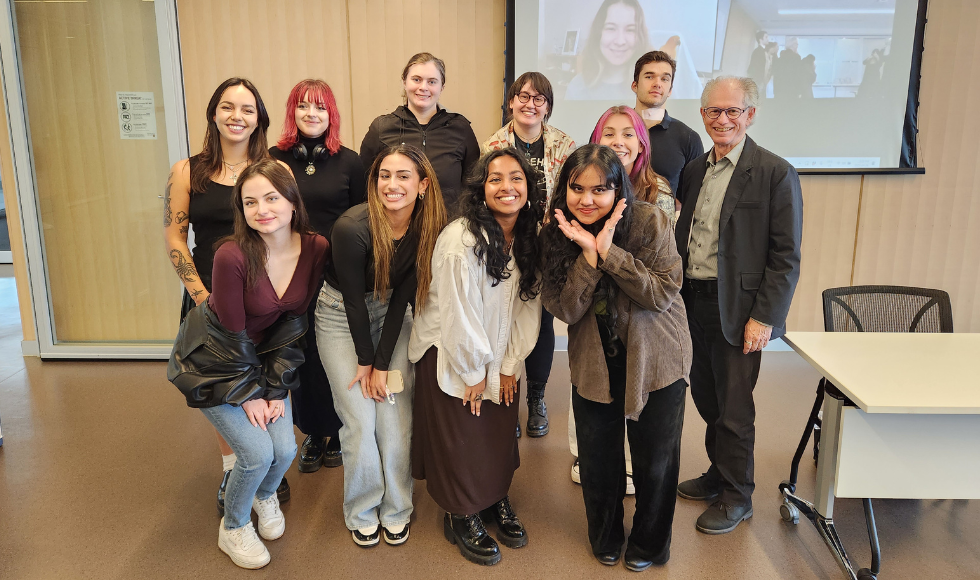Narrative arts certificate provides space for writers to evolve and connect

Applications for the Concurrent Certificate in Creative Writing and Narrative Arts will be accepted from February 2, 2024-March 18, 2024.
If you were asked to imagine your favourite writer hard at work on their next novel or collection of poetry, you might envision them by themselves — just the writer, their thoughts and the blank page.
This picture may very well be accurate, but if you zoomed out, you’d also see that writer surrounded by a community of people, supporting them and helping to shape their work.
In 2022, when the Department of English and Cultural Studies began welcoming students into its newly founded Concurrent Certificate in Creative Writing and Narrative Arts (CWNA), the department knew the creation of a supportive community would be key to each student’s success.
With a first cohort having earned their certificates and applications now open for the next round of students, the CWNA program provides the opportunity for students from across the university to strengthen their writing skills though the support and guidance of mentors and a community of their peers — just like the pros do.
Writing across disciplines
Nadine El Ashy, who had gained a strong interest in writing during her third year of her undergraduate studies in life sciences, saw the CWNA certificate as an opportunity to explore her interest in poetry and improve her overall approach to writing.
“The CWNA certificate was the perfect way for me to combine my love for writing with my science focused program,” she says.
As the first Life Sciences student to earn a CWNA certificate, she is grateful she had the opportunity to pursue a subject that mattered to her, even though it existed outside her faculty of focus.
“The way I approach writing is completely different than how I did before,” she says.
CWNA classes helped her to hone her craft by pushing her to explore new topics, practice writing for a specific audience while remaining authentic to her own voice, as well as writing though moments of imperfection.
“I learned that I should write as frequently as possible, ignoring the mistakes and typos along the way. Freeing myself from internal judgment when writing has been such a valuable lesson.”
Give and take
Being able to provide and receive feedback is a valuable life skill that sets students up to thrive, no matter where their futures may take them. CWNA classes are set up in a workshop format where students share their own writing and read the work of their peers, providing a unique opportunity to develop skills around taking and delivering constructive criticism.
“The classroom felt like a space where I could have these discussions without fear of judgement or ridicule,” says Matthew Aksamit, a fifth-year English and Cultural Studies student who is completing the CWNA program.
“Having experienced what it means to workshop alongside a community of writers, I felt like I walked away seeing how crucial it is to have other people reading your work, talking about it, and expressing their honest thoughts.”
For Aksamit, sharing his work with peers was a learning curve but ended up being the most valuable part of the program for them.
It takes a village (of fellow writers)
The CWNA program recognizes that creative writing isn’t just an individual pursuit, but one that happens in and for the community.
Rijaa Khan, a fifth-year student completing concurrent degrees in applied psychology in human behaviour as well as English and cultural studies says that being exposed to the writing of her peers while completing the program inspired her to write more.
“I was incredibly lucky to have people in my writing groups who were willing to be critical, helpful, and meticulous in their observation of my work, so much so that I inevitably had no choice but to truly challenge my writing capabilities,” says Khan.
Belonging to a community of writers also creates a space to engage in collective problem solving and learn from the experiences of peers and instructors in the program.
“One of the most beneficial aspects I learned was the process of writing, how to overcome writer’s block, and how to get work in the publishing world and the challenges that come with it,” says El Ashy. “I was able to relate to my peers and professors when it came to the struggles of writing and trying to constantly be inspired.”
Capstone projects
In the final year of study, CWNA students participate in a series of workshops, culminating in a creative writing capstone project.
The capstone projects provide students with the opportunity to explore a particular genre in depth and learn what it takes to produce a longer form piece of writing.
Matthew Aksamit used the capstone project as an opportunity to push himself to explore personal memoir — a genre outside of poetry, which is the form they typically work in.
“I’m glad I used the capstone as an opportunity to experiment, because not only did this reignite my passion for longer fiction, but it also took me out of my comfort zone, which is something I needed in order to progress in my writing journey,” he says.
How to apply
Applications for the CNWA program, which should include a statement of interest plus a portfolio of 10 double-spaced pages of original creative writing in more than one genre, will be accepted starting February 2, 2024 through Mosaic with a deadline of March 18, 2024. For more information on program requirements and application details, visit here.
CNWA Introduction Event: If you are curious to learn more before applying to the program, you are invited to attend an introduction event on February 15, 2024 from 5-7pm where you can meet CNWA alumni and participate in a Q&A session. Learn more here.


